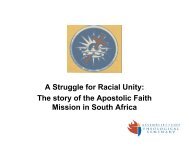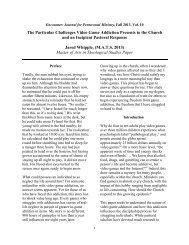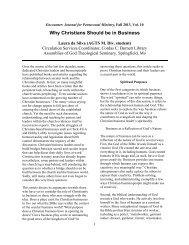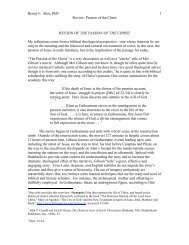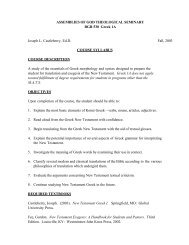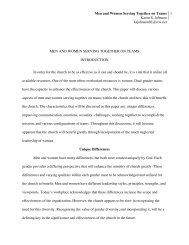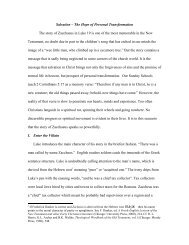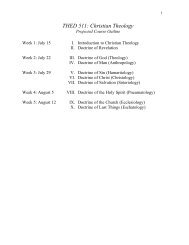Encounter: Journal for Pentecostal Ministry - Assemblies of God ...
Encounter: Journal for Pentecostal Ministry - Assemblies of God ...
Encounter: Journal for Pentecostal Ministry - Assemblies of God ...
Create successful ePaper yourself
Turn your PDF publications into a flip-book with our unique Google optimized e-Paper software.
seventeenth century brought about a<br />
renewed emphasis on “love <strong>for</strong> the poor,” as<br />
well as the “Evangelical Revival” and the<br />
rise <strong>of</strong> Methodism through John Wesley in<br />
the eighteenth century. 94 Wesley supported<br />
an egalitarian understanding <strong>of</strong> the gospel<br />
message that advocated weekly visitation to<br />
the poor, as well as personal relationship and<br />
hospitality toward those living in poverty. 95<br />
This type <strong>of</strong> care <strong>for</strong> the poor was “an<br />
„absolute duty‟ <strong>of</strong> the Christian, the neglect<br />
<strong>of</strong> which could endanger one‟s „everlasting<br />
salvation.‟” 96<br />
One might observe that the Church‟s<br />
concern <strong>for</strong> the poor became a dividing issue<br />
primarily in the nineteenth century. The idea<br />
<strong>of</strong> “pew renting” as a means <strong>of</strong> supporting<br />
churches in maintenance and building led to<br />
embarrassment <strong>of</strong> the poor who had to sit in<br />
the “free pews” and disadvantaged section. 97<br />
“Free churches,” opposing these practices<br />
and attempting to create a sense <strong>of</strong> equality<br />
in their congregations, opened the doors <strong>for</strong><br />
the poor to worship with the wealthy. 98<br />
In the twentieth century, the <strong>Pentecostal</strong><br />
movement tended to minister to the poor as<br />
a result <strong>of</strong> its heavy emphasis on responding<br />
to the needs <strong>of</strong> the “whole person,” whether<br />
physical, spiritual, emotional, or material. 99<br />
However, the debates between<br />
fundamentalist and liberal churches<br />
regarding salvation and the “social gospel”<br />
created a significant amount <strong>of</strong> conflict. 100<br />
While liberals <strong>of</strong>ten concerned themselves<br />
with the social needs <strong>of</strong> humanity, many<br />
fundamentalists heavily focused on the<br />
spreading <strong>of</strong> the gospel message to the<br />
neglect <strong>of</strong> reaching out to meet other needs<br />
<strong>of</strong> humanity.<br />
The rise <strong>of</strong> liberation theology created a<br />
significant amount <strong>of</strong> debate and conflict<br />
regarding poverty and the oppressed.<br />
Liberation theology, primarily expressed<br />
14<br />
within the Roman Catholic Church,<br />
emphasizes the Christian mission to the poor<br />
and oppressed through political activism. 101<br />
Sin and injustice is seen in capitalism and<br />
class war. 102 This type <strong>of</strong> theology is <strong>of</strong>ten<br />
found in Latin America and among the<br />
Jesuits, and is a <strong>for</strong>m <strong>of</strong> Christian socialism<br />
that arose after the Second Vatican<br />
Council. 103 Liberation theology is extremely<br />
controversial due to its justification <strong>for</strong><br />
revolutionary action. 104<br />
Despite the conflict over liberation theology,<br />
the Catholic Church has <strong>of</strong>ten exhibited a<br />
strong mission to the poor throughout its<br />
history. Such groups as the Jesuits set out to<br />
aid the poor and give to the needy.<br />
Catholicism stresses the need <strong>for</strong> the church<br />
to give to the poor through the building <strong>of</strong><br />
schools and hospitals <strong>for</strong> the underprivileged<br />
and through other <strong>for</strong>ms <strong>of</strong><br />
benevolence ministry. 105 The option <strong>for</strong> the<br />
poor has <strong>of</strong>ten become part <strong>of</strong> the Catholic<br />
social teaching, especially in the experience<br />
<strong>of</strong> the Latin American Church. 106 In their<br />
1987 statement entitled Economic Justice<br />
<strong>for</strong> All, the Catholic bishops in the United<br />
States articulated five primary principles<br />
regarding wealth and poverty:<br />
1. Every economic decision and<br />
institution must be judged in<br />
light <strong>of</strong> whether it protects or<br />
undermines the dignity <strong>of</strong> the<br />
human person.<br />
2. Human dignity can be realized<br />
and protected only in<br />
community.<br />
3. All people have a right to<br />
participate in the economic life<br />
<strong>of</strong> society.<br />
4. All members <strong>of</strong> society have a<br />
special obligation to the poor and<br />
vulnerable.



